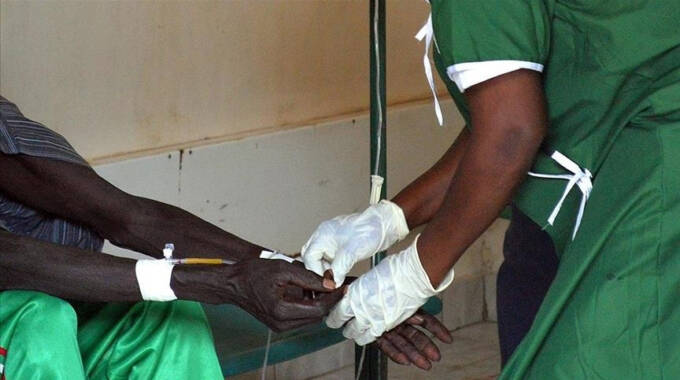
The ManicaPost

Gatherings suspended
Family loses five members in two weeks
Samuel Kadungure
Senior Reporter
TWENTY-THREE cholera deaths have been officially confirmed in Buhera, while there is a worrying rise in suspected cases in areas along Mwerihari and Save rivers.
The Government has since introduced various measures like suspending social gatherings to prevent the spread of the disease.
Twenty-five new cases were confirmed in Chipinge, with the cases epidemiologically linking the outbreak to the use of contaminated water from Save River, which cuts across Buhera and Chipinge.
As it stands, the second wave of the outbreak has seen about 450 cases being recorded in Manicaland, with 422 cases in Buhera alone.
In some instances, victims are allegedly shunning treatment, while other cases are presented late, leading to high institutional fatalities.
In Buhera, the Marungwana family in Marungwana Village lost four children aged between two months and 16 years, as well as their daughter-in-law within two weeks.
The four children did not get treatment although their family suspected that they had eaten poisoned vegetables.
The daughter-in-law, Ms Tecla Mulilo, had an underlying condition and later died after admission at Murambinda Mission Hospital.
The family’s patriarch, Mr Amon Marungwana described the situation as dire and difficult to accept.
“The death of the children is difficult to accept. “We also lost a daughter-in-law who sought medication late and could not make it as she had an under lying condition.
“Cholera decimated my family and other people out there should get treatment on time, wash their hands with running water and soap or ashes, boil water for drinking, have proper sanitary facilities, and exercise hygienic practices,” he said.
His young brother, Mr Robert Marungwana, said the deaths were unavoidable.
“We did not know how to go about it as a family. It is up to Government to dictate what to do because we do not seek treatment. Yes, the tragedy really devastated us considering that the deaths were one after the other for two weeks. We never stopped mourning. We have surrendered it to God because death is God’s will. You cannot stop it,” he said.
Manicaland Provincial Medical Director, Dr Munyaradzi Mukuzunga recently outlined a raft of measures put in place to contain the outbreak.
“Currently, we have set up cholera treatment camps in various areas. We have also increased surveillance and active case finding as we work with the local leadership and village health workers. The cases are still increasing as more people are presenting with symptoms,’ he said.
A Civil Protection Unit (CPU) meeting was held in Buhera on Tuesday, with the district’s environmental health officer, Mr Constantine Charivanda, painting a gloomy picture.
He also highlighted Government’s efforts to eradicate the waterborne disease.
Mr Charivanda said cholera cases are increasing along Mwerihari and Save Rivers, adding that church night vigils, livestock markets and other gatherings that attract a lot of people from outside the district have been suspended for two weeks to control the outbreak.
Mr Charivanda said most children dying of cholera are from families that do not seek medical services either for religious or cultural reasons, as well as those that live in poor and remote communities where health systems are less resilient.
“So far, Buhera has recorded 422 suspected cholera cases and 23 deaths.
“The reaction upon noticing the first symptoms is not instant, the people are reporting late, and it is also turning out that most have underlying conditions, leading to high institutional deaths,” said Mr Charivanda.
He implored stakeholders to urgently address treatment hesitancy by implementing an inclusive community engagement strategy that involves dissemination of information on the disease and debunking religious and cultural myths towards treatment.
“Our infections are more in this particular section of society as the size of the households is big. A household can have 10 wives, 36 children, and if one of them is infected, you are guaranteed of more than 20 cases.
“The children will go to school and the borehole, and because the community does not have enough amenities, some households defecate in rivers and bushes, thereby putting the whole community at risk. This is an area that needs urgent attention,” said Mr Charivanda.
Mr Chivarandi said laboratory tests have revealed that water in Save and Mwerihari Rivers is contaminated and should not be used for human consumption.
“When people defecate in the river, they contaminate the water. The water was tested for faecal coliform, and the findings were in the affirmative, but further tests are required to establish what kind of faecal coliform is in the two rivers.
“However, epidemiologically it looks like the people using this water are the affected ones. The communities in hotspots have been advised to avoid using water from the rivers for domestic use, but we have some areas where it is the only available option,” said Mr Chivarandi.
Chipinge district health promotion officer, Ms Exgratia Chidoko said cases of cholera are on the rise, although no fatalities have been recorded in the district.
“Since this wave of cholera hit Buhera, we have seen an increase of the disease in Chipinge. As of Tuesday, 25 cases had been confirmed. Major sources of the disease are water points. We also have another hotspot at Kondo area where it was traced that victims are contracting the disease from a water point at Zakatani borehole,” said Ms Chidoko.
Through efforts of Government and its partners, villagers are getting cholera kits that include soap, water-sterilising aquatabs, buckets and food.
The CPU is also running a campaign to remind people to wash their hands before eating and after using the toilet to prevent the spread of cholera.
The cholera outbreak is believed to have started in August, with funerals and other major gatherings cited as super spreaders.
Negative perceptions to modern medicines and health services are embedded in the religious views that ascribe their use to lack of faith in God.



